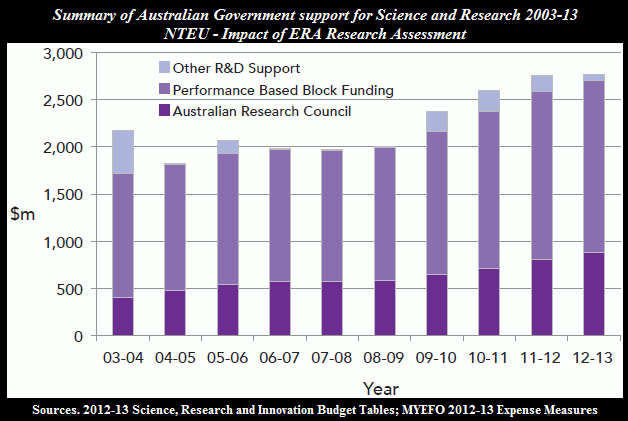|
Editorial
- 01 May 2013 |
|
National Tertiary Education Union |
Public Support for University Research 3 Views |
The Group of Eight |
This
past week has brought forth documents from the
Nation Tertiary Education Union (NTEU)
and the
Group of Eight![]() (Go8) commenting on aspects of public support for Research at
Australia's universities.
(Go8) commenting on aspects of public support for Research at
Australia's universities.
The NTEU document -- Impact of ERA Research Assessment on University Behaviour and their Staff -- essentially sums up its disquiet in a single sentence: "whatever concerns university staff have had about the robustness and probity of the ERA instrument, a pressing concern is what the ERA will be ultimately used for, as the ERA has been integrated into more intense modes of university managerialism."
The Go8 phrases its comparable concerns: "If Australia is to capture the full benefits of the creative, original and imaginative efforts of its researchers, it will always need a means to support the ideas and challenges coming from individuals and small groups, even when these ideas fall outside formal priority setting mechanisms. Top-down approaches to the setting of research strategies are of considerable value and work well in certain parts of the research system because it is possible to link them to research management processes that focus on a predefined outcome. However, universities and the broader role they play within the innovation system need support for bottom-up approaches that allow tapping into the unfettered genius of our most creative people – those who can move from the immediate confines of the present and will go on to create the future," which is a carefully worded plea against increasingly "intense modes of university managerialism".
And this brings us to the matter of the distribution of research funding for our universities:

It's noteworthy that performance-based block funding is over twice that derived from ARC competitive grants. Of course the block funding covers a broad range of needs to allow university researchers to carry out their projects but that funding gives university management considerable power over the hearts and minds of its staff, and in turn the distribution of those funds by the government of the day can, if it so choses, exercise virtual dictatorial power over research direction.
All of which brings us to the matter of on-costs. All ARC grants for experimental research are grossly inadequately costed for which they are allocated. As a result universities must find additional funds to make up the short fall, and some of our universities are in a much better position than others to do so. Furthermore, university administrations in the throes of "intense modes of university managerialism" can strongly influence researchers to "see things the way we do" and "bottom-up" approaches are not high on the agenda.
In addition young bright researchers who happen to be at one of our minor universities and are interested in areas which their departments are not seen as "exceptional" are -- well pretty much shafted. If they want to continue in academe they have little choice but to pursue research with a likelihood of short-term success.
And the result, a university research sector that if not mediocre is not nearly as capable as it could be.
Australia's quiet, but plain speaking, 2009 Nobel Laureate, Elizabeth Blackburn put it this way: "I think there are tremendously good scientists in Australia but sometimes I just feel, are they really being able to run with it in the way they are capable of?" Professor Blackburn asked rhetorically of Mr Trounson, and went on to say that in the US, she benefited from a five-year grant that allowed her to follow her nose without having to write up "damn little" reports and catalogue milestones on a regular basis. "This was the perfect setting and I'm not aware that I would have been able to do that [here]." And to make sure she was getting her message across: "Short dribs and drabs" of money with tight constraints on basic research are in her opinion wasteful.
Alex Reisner